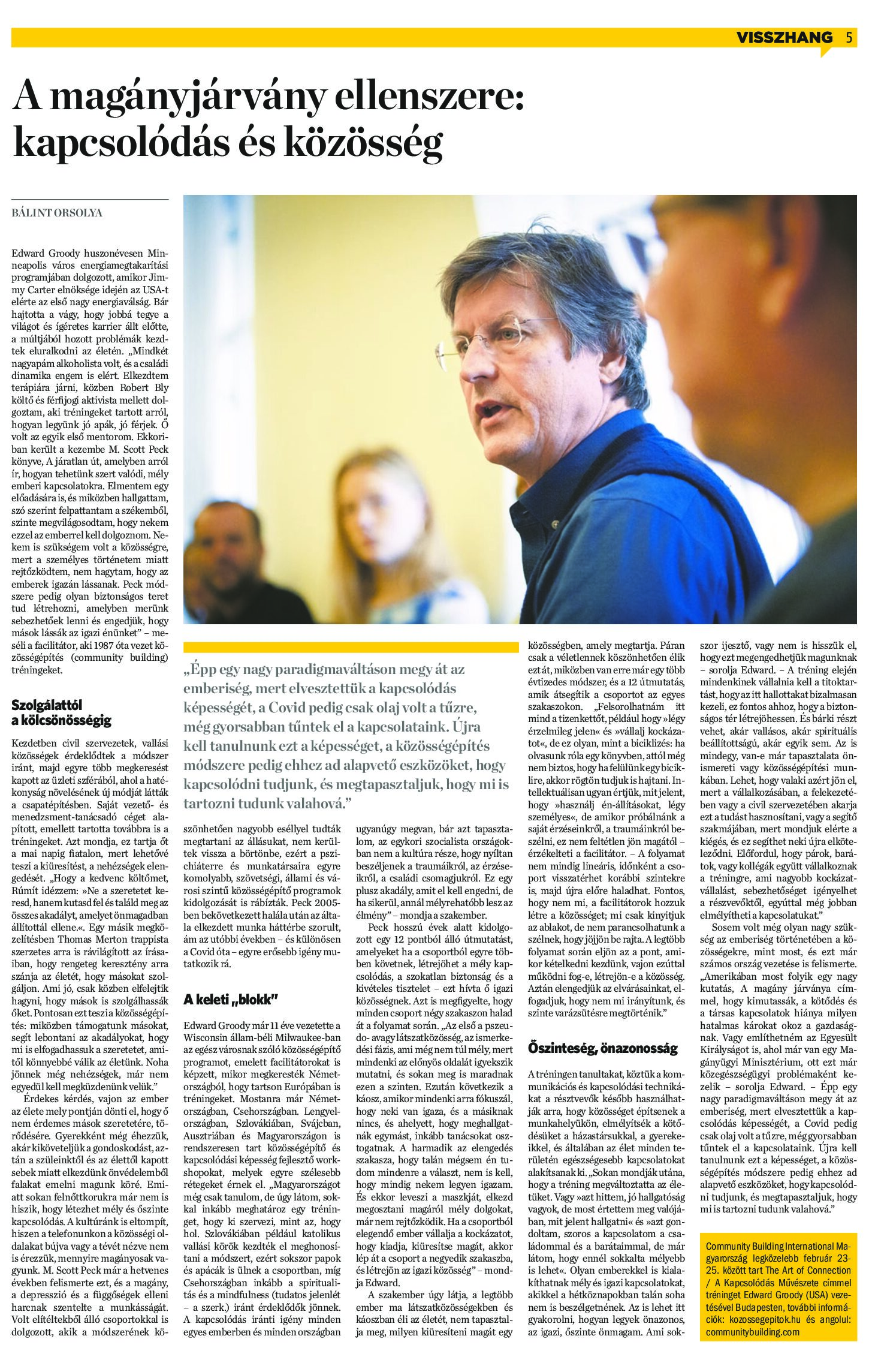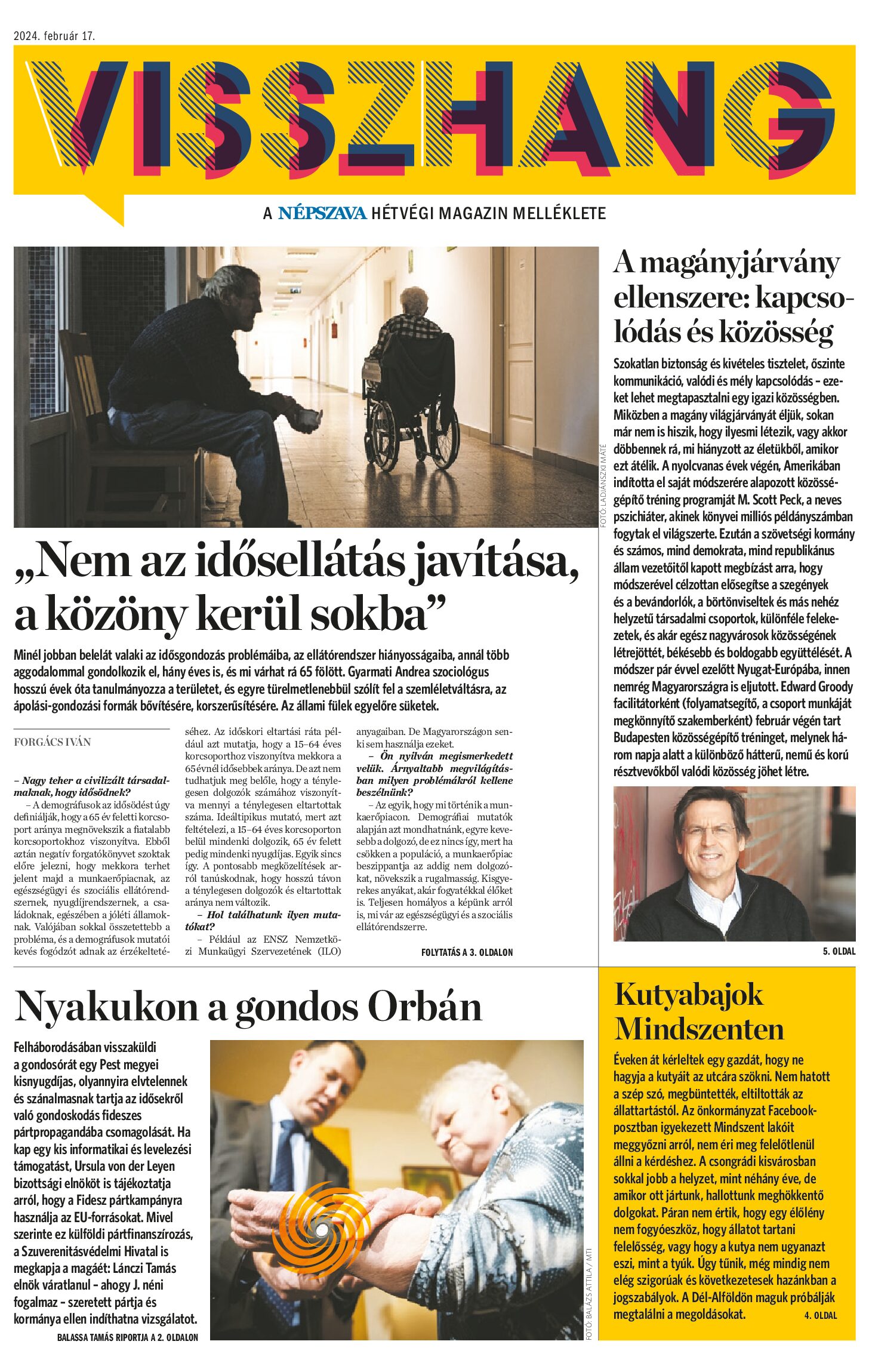ENGLISH TRANSLATION
The Antidote to the Loneliness Epidemic: Connection and Community
Unusual security and exceptional respect, honest communication, real and deep connection – these can be experienced in a real community. As we live through the loneliness pandemic, many people don’t even believe that such a thing exists anymore, or they realize what they’ve been missing in their lives when they experience it.
At the end of the eighties, in America, M. Scott Peck, the well-known psychiatrist, started his community-building training program based on his own method, whose books have sold millions of copies worldwide. He was then commissioned by the federal government and several state leaders, both Democratic and Republican, to use his method to help the poor and the creation, peaceful and happy coexistence of the community of immigrants, prisoners and other social groups in difficult situations, various religions, and even entire cities. The method made its way to Western Europe a few years ago, and from there recently to Hungary.
As a facilitator, Edward Groody holds a community-building training in Budapest at the end of February, during which a real community can be created from participants of different backgrounds, genders and ages.
In his twenties, Edward Groody was working in the energy saving program of the city of Minneapolis when the first major energy crisis hit the USA during Jimmy Carter’s presidency. Although he was driven by the desire to make the world a better place and had a promising career ahead of him, problems from his past began to dominate his life.
“Both of my grandfathers were alcoholics, and the family dynamic got to me. I started going to therapy, while working with poet and men’s rights activist Robert Bly, who held training sessions on how to be good fathers and husbands. He was one of my first mentors. It was at this time that I came across M. Scott Peck’s book, The Road Not Traveled, in which he writes about how we can gain real, deep human relationships. I also went to one of his lectures, and while I was listening, I literally jumped out of my chair, I was almost enlightened that I had to work with this person. I also needed the community, because I hid because of my personal story, I didn’t let people really see me. And Peck’s method can create a safe space in which we dare to be vulnerable and let others see our true selves,” says the facilitator, who has been leading community building trainings since 1987.
From Service to Reciprocity
In the beginning, civil organizations and religious communities were interested in the method, and then it received more and more inquiries from the business sector, where they saw a new way of increasing efficiency in team building. He founded his own leadership and management consulting company, and also continued to hold training sessions. He says that this keeps him young to this day, because it allows him to vent and let go of difficulties.
“To quote my favorite poet, Rúmi: “Don’t look for love, but explore and find all the obstacles you have placed against it in yourself.” In another approach, the Trappist monk Thomas Merton highlighted in his writings that many Christians dedicate their lives to serving others. Which is good, only in the meantime they forget to let others serve them. This is exactly what community building does: while we support others, it helps break down barriers so that we too can accept love, which makes our lives easier. Although there are still difficulties to come, we no longer have to deal with them alone.”
It is an interesting question, at what point in one’s life does one decide that one is not worthy of the love and care of others. As children, we still starve, we even demand care, then because of the wounds we received from our parents and life, we start to build walls around ourselves in self-defense. For this reason, many people no longer believe that a deep and sincere connection can exist in adulthood. Our culture also dulls us, because we don’t even feel how lonely we are when we are hiding on social media or watching TV on our phones. M. Scott Peck recognized this already in the 1970s and devoted his work to the fight against loneliness, depression and addictions. He also worked with groups of ex-convicts, who, thanks to his method, were more likely to keep their jobs and did not return to prison, which is why the psychiatrist and his colleagues also developed increasingly serious community-building programs at the federal, state and city levels. entrusted to him. After Peck’s death in 2005, the work he started was relegated to the background, but in recent years – and especially since Covid – there has been an increasingly strong demand for it.
The Eastern “Bloc”
Edward Groody has been leading the community-building program for the entire city in Milwaukee, Wisconsin, for 11 years. He also trained senior facilitators when he was approached from Germany to hold training sessions in Europe. It is now in Germany and the Czech Republic. In Poland, Slovakia, Switzerland, Austria and Hungary, he regularly holds community-building and connection-building workshops, which reach an increasingly wide range of people. “I’m still learning about Hungary, but I see that a training is much more determined by who organizes it than where. In Slovakia, for example, Catholic religious circles have started to introduce the method, which is why priests and nuns often sit in the group, while in the Czech Republic people interested in spirituality and mindfulness (conscious presence) come. The need for connection is in every person and every country in the same way, although I have experienced that in the former socialist countries it is not part of the culture to talk openly about their traumas, their feelings, their family package. This is an additional obstacle that must be overcome, but if you succeed, the experience will be more profound,” says the specialist.
Over the course of many years, Peck developed a set of 12 points, which, if more and more of the group follow, can create a deep connection, unusual security and exceptional respect – this is what he called true community. He also observed that each group goes through four stages in the process. “The first is the pseudo- or pretend community, the getting-to-know-you phase, which is not very deep yet, because everyone tries to show their advantageous side, and many stay at this level. Chaos then follows, when everyone focuses on the fact that he is right and the other is wrong, and instead of listening to each other, they give advice. The third is the stage of letting go, that maybe I don’t know the answer to everything, I don’t have to be right all the time. And that’s when he takes off his mask, starts sharing deep things about himself, doesn’t hide anymore. If enough people from the group take the risk to give themselves out, to empty themselves, then the group moves to the fourth stage and the real community is created,” says Edward.
The specialist sees that most people today live their lives in sham communities and chaos, they do not experience what it is like to empty oneself in a community. A few only experience this by chance, while there is already a decades-old method for this, and the 12 guidelines that help the group through the individual stages. “I could list all twelve here, for example, ‘be emotionally present’ and ‘take risks’, but it’s like riding a bike: if you read about it in a book, it doesn’t mean that if you get on a bike, then we can drive right away. Intellectually, we understand what it means to “use self-statements, be personal”, but when we try to talk about our own feelings and traumas, it doesn’t necessarily come naturally, the facilitator points out.
“The process is not always linear, sometimes the group can return to previous levels and then move forward again. It is important that we, the facilitators, do not create the community; we only open the window, but we cannot command the wind to come in through it. During most processes, there comes a point when we start to doubt whether this time it will work, whether the community will be created. Then we let go of our expectations, accept that we are not in control, and it happens almost like magic.”
“Humanity is going through a big paradigm shift, because we have lost the ability to connect, and Covid was just fuel to the fire, our relationships disappeared even faster. Again we have to learn this ability, and the method of community building gives us basic tools for this, so that we can connect and experience that we too can belong somewhere.”
Honesty, self-identity
The participants can later use what they learned in the training, including communication and connection techniques, to build a community at their workplace, deepen their bond with their spouse and children, and generally be healthier in all areas of life. develop relationships.
“Many people say afterwards that the training changed their lives. Or “I thought I was a good listener, but now I really understood what it means to listen” and “I thought I had a close relationship with my family and friends, but now I see that it can be much deeper than that” . They can also form deep and real relationships with people they might never talk to on a regular basis. You can also practice here how to be self-identified, the real, honest self, “which many-sometimes it’s scary, or we don’t even believe that we can afford it,” says Edward.
“At the beginning of the training, everyone must agree to keep what they hear here confidential, this is important in order to create a safe space. And anyone can participate, religious, spiritual, or neither. It doesn’t matter whether you already have experience in self-knowledge or community building work. Maybe someone comes because they want to use this knowledge in their business, religion, or NGO, or in their helping profession, because, say, they have reached burnout and this can help them re-engage. It happens that couples, friends, or colleagues undertake the training together, which may require greater risk-taking and vulnerability from the participants, and at the same time, it may deepen their relationship even more.”
There has never been such a great need for communities in the history of mankind as now, and the leadership of many countries has already recognized this. “In America, there is a big research going on right now, entitled The Loneliness Epidemic, to show the huge damage the lack of attachment and social relations causes to the economy. Or I could also mention the United Kingdom, where there is already a Ministry of Private Affairs, where this is already treated as a public health problem, – lists Edward. – Humanity is going through a big paradigm shift, because we have lost the ability to connect, and Covid was just fuel to the fire, our relationships disappeared even faster. We have to learn this ability again, and the method of community building gives us basic tools for this, so that we can connect and experience that we too can belong somewhere.”


